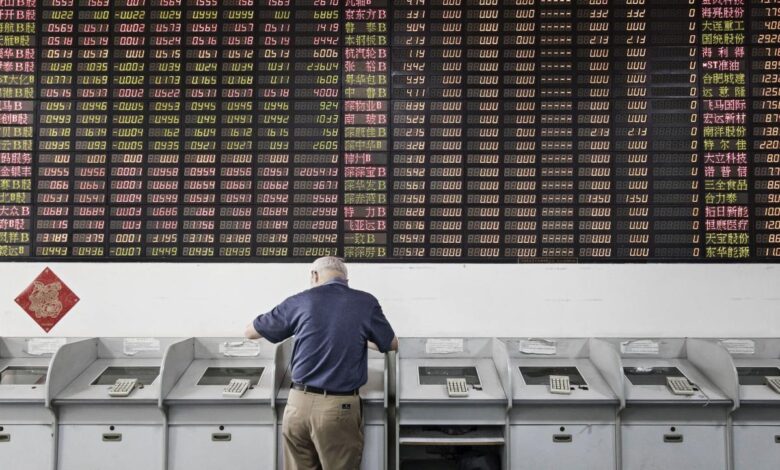
[ad_1]
(Bloomberg) — China’s authorities are stepping up efforts to stabilize the stock market after a massive selloff. The collapse in valuations since a peak in 2021 makes them the world’s “best value proposition,” according to at least one market veteran. Others remain unconvinced, saying the economy faces some tough challenges which will keep hampering stocks. So is this a golden moment or a value trap?
Most Read from Bloomberg
1. How bad has the equities rout been and what’s behind it?
Few equity markets in the world have fallen as much as China and Hong Kong. The CSI 300 benchmark for shares traded on the mainland declined for the third straight year through 2023 and has lost another 2.6%. A Hang Seng gauge of Chinese stocks trading in Hong Kong fared worse.
Investors started selling out in 2021, when China’s private sector crackdown went into full gear. Covid Zero restrictions further worsened sentiment toward the market. Stocks staged a strong rebound through late 2022-early 2023 as China reopened its economy, but the optimism has all but evaporated.
A prolonged property slump, growing deflationary pressures, tensions with the US and structural problems including a shrinking population are making investors doubt the market’s long-term potential.
2. What’s that done to their valuations?
The CSI 300 Index has fallen more than 40% from its 2021 peak while the Hang Seng China Enterprises Index has lost over 50%. In all, roughly $6.3 trillion has been wiped out from the market value of Chinese and Hong Kong stocks since their highs. That means their valuations are near historically-low levels and on some measures, the cheapest-ever against peers in major markets like India and the US.
The HSCEI gauge now trades at about 6.5 times forward earnings estimates, below a five-year average of 8.5. Compare that to readings of roughly 20 for S&P 500 and India’s Nifty 50 Index — markets that saw hot rallies over the past year. At such low valuations, theoretically, upward potential is strong.
3. What are authorities doing to help out?
As the economy and equities struggled, policymakers have taken a series of actions — but none were deemed sufficient. Investors betting on a bazooka of stimulus — like the ones seen during the global financial crisis — were left out in the cold. Measures including ETF purchases by state funds, lowering stock trading stamp duties, and limits on new equity listings provided a short-lived rebound at best.
But authorities have ramped up their support recently, leading to hopes that this time may be different. Stocks have responded with a rare three-day advance this week.
Bloomberg reported on Jan. 23 that policymakers are considering a stock market rescue package which includes about 2 trillion yuan ($279 billion) to buy shares onshore through the Hong Kong exchange link. A day after the news broke, the People’s Bank of China said it will cut the reserve requirement ratio for banks and hinted at more support measures to come. Now all eyes are on when the reported rescue plan will be finalized.
4. Does that make China stocks a ‘screaming buy’
While it’s tempting to enter the market amid early signs of a rebound, skeptics warn that nothing fundamental has changed. China has yet to find ways to resuscitate the property market, convince consumers to spend, and prevent a deflationary spiral. The upcoming earnings season will likely be lackluster.
Those repeatedly burnt during the yearslong rout are now once bitten, twice shy. Investors are also well aware that Beijing’s policies can shift at a whim and are wary of being disappointed again if the stimulus underwhelms. Pictet Asset Management says China is cheap but still lacks positive changes.
Yet those who believe in the country’s potential as the world’s second-biggest economy see reasons to turn optimistic. Gavekal group’s co-founder Charles Gave said China’s battered equities now offer the best value in the world.
What’s certain is that with the market so riddled with unknown risks, it has become a place for the brave.
5. I’m feeling brave, how do I dive in?
Foreign investors can invest in shares listed in Shanghai and Shenzhen through trading links with Hong Kong. A majority of stocks trading in Hong Kong are also mainland firms, and easier to invest.
They can also buy exchange-traded funds listed overseas such as the iShares MSCI China ETF, Xtrackers Harvest CSI 300 China A-Shares ETF and KraneShares CSI China Internet ETF.
Other options include mutual funds and investing in American Depository Receipts — shares of Chinese firms that trade in the US. Major tech firms including Alibaba Group Holding Ltd., Baidu Inc. and JD.com all have listed ADRs. The Nasdaq Golden Dragon China Index tracks those companies.
Most Read from Bloomberg Businessweek
©2024 Bloomberg L.P.
Source link




